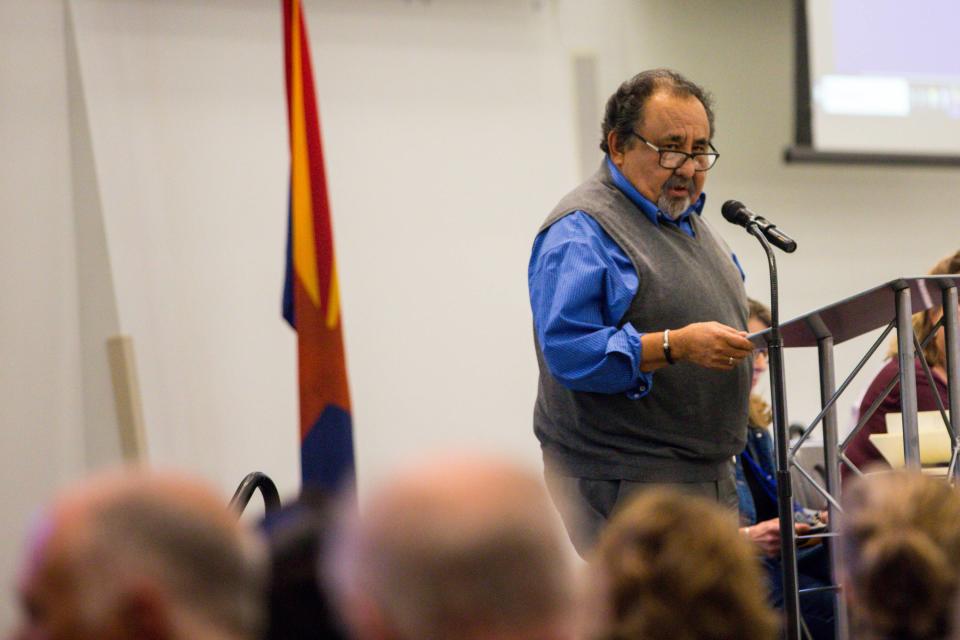Why Arizona's far-right and far-left Congress members are wary of renewing a spy program
Rarely do conservative Rep. Andy Biggs and liberal Rep. Raúl Grijalva sign onto the same policy letters on Capitol Hill.
But the nearing expiration of a controversial spy program, viewed warily by progressives and MAGA Republicans alike, has united them.
At the center of the legislative fight is Section 702 of the Foreign Intelligence Surveillance Act, which allows the government to search communications of certain non-Americans located overseas without a warrant.
Information about Americans may be revealed in the course of those authorized searches, or gathered improperly using the Section 702 database, which critics say amounts to an unconstitutional “backdoor.”

In a letter last week signed by Biggs, R-Ariz.; Grijalva, D-Ariz.; and Rep. Paul Gosar, R-Ariz.; lawmakers argued against renewing the program in the short-term without amending it, as congressional leaders are reportedly considering.
“It would be an inexcusable violation of the public’s trust to quietly greenlight an authority that has been flagrantly abused,” the letter reads. “If Section 702 is to be reauthorized for even a single day, it must be through standalone legislation subject to robust, open debate and amendment.”
Court documents unsealed earlier this year showed that the FBI improperly used a Section 702 database in hundreds of thousands of searches, including for people involved in the Jan. 6, 2021, U.S. Capitol riot and to the 2020 protests following the murder of George Floyd.
Biggs has introduced a bill that would require a warrant to access communications of Americans that were acquired under the law, among other reforms.

That legislation is opposed by many members of Congress closer to the center of the political spectrum. The Biden administration defends the program as a critical national security tool.
“Under narrow circumstances and robust oversight, it might become prudent for the government to quickly use an identifier associated with a U.S. person, such as a phone number with a 202 area code, for example, to look through lawfully obtained Section 702 information and follow up,” wrote Rahul Gupta, director of the White House’s drug control policy office, in a recent op-ed. “The proposal that the U.S. government obtain a warrant before conducting a U.S. person query to pursue these leads gives me serious pause.
“That could mean missing the opportunity to make a seizure of potentially deadly chemicals or to interdict a foreign smuggler moving drugs toward our border."
Far-right extremists pose biggest domestic terrorism threat, officials say
Biggs’ embrace of Section 702 reform comes at a time when top U.S. law enforcement officials say far-right extremist movements are the biggest domestic terrorism threat facing the country.
Biggs has come under scrutiny for his ties to extremist groups. He was a leader in the push to overturn the 2020 election result, and was named as an inspiration by the organizers of the Jan. 6 rally outside the U.S. Capitol. In 2015, he spoke at a 2015 event at which another speaker called for the late Sen. John McCain to be "hung by the neck until dead." The man who made threat toward McCain — Oath Keepers founder Stewart Rhodes — earlier this year was sentenced to 18 years in prison for seditious conspiracy in connection with the Jan. 6 Capitol riot.
He was one of several Republican lawmakers who allegedly asked former President Donald Trump for a pardon following the Jan. 6 riot, according to a former Trump aide, who testified under oath for a House investigation.
Biggs emphatically has denied that allegation, saying that the Trump aide’s testimony was “mistaken” and that the video of her remarks was “deceptively edited to make it appear as if I personally asked her for a presidential pardon.” He refused to comply with a subpoena from the Jan. 6 committee, which would have required him to testify under oath about the happenings that day.
Biggs’ office did not respond to questions about his bill’s impact on the government’s ability to monitor far-right extremist groups, or his own ties to those groups’ actions.
FISA reform scrambles political coalitions
Criticized by both the left and right, Section 702 reauthorization historically has split Arizona's congressional delegation in unlikely ways.
When the program last came up for reauthorization in 2018, then-President Trump spoke out against it, claiming that the law was used to “surveil and abuse” his campaign, though he walked that position back soon after.
Biggs, Gosar, Grijalva, and Democratic Rep. Ruben Gallego voted against the bill that reauthorized the program until the end of 2023.
The rest of Arizona’s delegation, which included then-Democratic Rep. Kyrsten Sinema and Republican Rep. David Schweikert, voted in favor of it.
Grijalva has criticized FISA’s scope as early as 2007, when former President George W. Bush expanded the program’s wiretapping authorities.
“This President has made it clear that he does not feel bound by either the law or the Constitution. To grant the powers in this new law to any President would be troubling. To give such powers to this President in particular is inviting abuse of our most fundamental liberties,” he wrote in a statement at the time.
Laura Gersony is a national politics reporter for The Arizona Republic and azcentral.com. Contact her at 480-372-0389, or by email at [email protected]. Follow her on X, formerly known as Twitter, at @lauragersony.
This article originally appeared on Arizona Republic: Andy Biggs, Paul Gosar and Raúl Grijalva oppose renewing FISA as is
